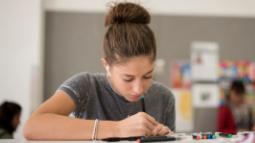Study SMARTer
Follow these quick tips to make studying more bearable and more successful.
When I used to hear the word study, I would start to nervously sweat and mildly panic. I don't know how my distaste for studying really began, but I do know that the very idea of studying used to fill me with complete and utter dread. I felt like it was pointless, because I would ultimately choke when my exam or final was handed to me.
Luckily, my fear of studying gradually subsided once I began to rethink the way I was reviewing my material from class. Although I would tell myself I had studied for five hours for one exam, paper or project, when I broke down what my study session ACTUALLY consisted of, it looked like this:
1 hr- Checking various social media sites as a "break"
30 min- Changing the font style, size and alignment to see if I could actually write less
45 min- Making the perfect Spotify playlist to help me focus
1hr- Talking about how unfair the assignment/professor/university is with my study group members
30 min- Looking for a Quizlet with all of the exam answers from a previous semester
1 hr- Watching Netflix "in the background"
15 min- Studying
If you are anything like the former me, here are five tips I've discovered about how to study SMARTer.
Start small.
One of the best ways to learn and understand information from lectures is to review key material after each class. This could mean just looking through notes and highlighting important topics, or adding the material to a gradually-created study guide. When writing an essay, don't try to write it all in one sitting the day before it's due. Write one paragraph at a time in the weeks leading up to the due date, so you relieve some stress and have time to edit your paper. Breaking down the information will not only help you avoid having weeks of material to study the day before the exam, but also improve your understanding and application of the information.
Minimize distractions.
Let's face it, having your phone nearby while studying is dangerous. Not only will it ruin your focus on the material, but also will tempt you to take long, unproductive breaks. When studying, or doing school work in general, it's best to leave your phone out of sight. By removing your phone, you will immediately free up time spent scrolling through social media, watching Netflix or texting friends. Another common mistake people make while studying is choosing a bad location. In theory, studying someplace comfortable, like a bed, would make the process more relaxing, but it actually signals to your brain that it's time to rest. For some, a coffee shop is the perfect study space, but for many people, the noise and environment can be distracting instead. It's important to identify which locations provide you the best state of mind to study, so you can avoid distracting environments.
Ask questions
This easy, but sometimes nerve-wracking tip is the key to successful studying. Simply put, if you don't fully understand what you're studying, the time put into it is pointless. This means that it's critical to attend your professor's office hours, visit the TRIO suite for tutoring, or ask classmates to explain the information. Asking questions is an inevitable part of taking college courses, so don't hesitate to admit that you don't understand the material.
Reward progress
It's hard to recognize your studying progress when it feels like an endless task, but it's important to start identifying personal achievements. This might mean that for every hour spent successfully studying, you take a 15-minute break for a walk, a snack or something relaxing. Or for others, it may mean allowing yourself to go out with friends after finishing an essay or presentation. It is also important to recognize the effort being put in to try and master the material. Even if the results aren't what you were expecting, acknowledge that the process of learning material is often more important than the outcome of a grade.
Test Yourself
Studying should not be a continuous state of being during your college experience. Once you feel like you have an understanding of the material, test yourself so you can move from studying to comprehension to application. You can make flashcards or create a Quizlet to test your knowledge about the information. Try to find practice test questions or writing prompts online to see how well you're prepared. If you are giving a presentation, be sure to practice it in front of your family or friends prior to the real deal. Successful studying is all about preparation, so rehearsing what the test, essay or presentation will be like will help you feel less nervous and better equipped to ace it.
Each person has their own strengths and weaknesses when it comes to studying. In order to succeed inside and outside the classroom, it's helpful to identify which study tips set you up to become the best student you can be.
— By Allie Barton, Journalism and Mass Communication, BS ‘19









